Book contributions
- "The Chinese Factor in Soviet Disarmament Policy" (Chapter 4). In: Halperin, Morton H. (editor). Sino-Soviet Relations and Arms Control. Cambridge: MIT Press (1967): 95-113. LCCN 67-12053
- "Written under the auspices of the Center for International Affairs and the East Asian Research Center, Harvard University."
Interviews
- Kennedy, Charles Stuart. "Interview with Helmut Sonnenfeldt." Association for Diplomatic Studies and Training (July 24, 2000) Foreign Affairs Oral History Project.
Awards
Sonnenfeldt has also been honored by the governments of France, Germany, Luxembourg, and Sweden.
Related Research Articles

Henry Alfred Kissinger was an American diplomat and political scientist who served as the 56th United States secretary of state from 1973 to 1977 and the 7th national security advisor from 1969 to 1975, serving in the presidential administrations of both Richard Nixon and Gerald Ford.

The Council on Foreign Relations (CFR) is an American think tank specializing in U.S. foreign policy and international relations. Founded in 1921, it is an independent and nonpartisan 501(c)(3) nonprofit organization. CFR is based in New York City, with an additional office in Washington, D.C. Its membership has included senior politicians, secretaries of state, CIA directors, bankers, lawyers, professors, corporate directors, CEOs, and prominent media figures.
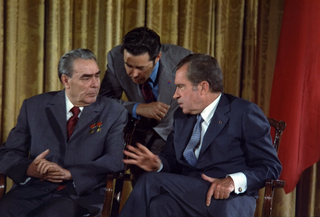
Détente is the relaxation of strained relations, especially political ones, through verbal communication. The diplomacy term originates from around 1912, when France and Germany tried unsuccessfully to reduce tensions.

Brent Scowcroft was a United States Air Force officer who was a two-time United States National Security Advisor, first under U.S. President Gerald Ford and then under George H. W. Bush. He served as Military Assistant to President Richard Nixon and as Deputy Assistant to the President for National Security Affairs in the Nixon and Ford administrations. He served as Chairman of the President's Foreign Intelligence Advisory Board under President George W. Bush from 2001 to 2005, and advised President Barack Obama on choosing his national security team.
The Jackson–Vanik amendment to the Trade Act of 1974 is a 1974 provision in United States federal law intended to affect U.S. trade relations with countries with non-market economies that restrict freedom of Jewish emigration and other human rights. The amendment is contained in the Trade Act of 1974 which passed both houses of the United States Congress unanimously, and was signed by President Gerald Ford into law, with the adopted amendment, on January 3, 1975. Over time, a number of countries were granted conditional normal trade relations subject to annual review, and a number of countries were liberated from the amendment.

The Center for Strategic and International Studies (CSIS) is an American think tank based in Washington, D.C. From its founding in 1962 until 1987, it was an affiliate of Georgetown University, initially named the Center for Strategic and International Studies of Georgetown University. The center conducts policy studies and strategic analyses of political, economic and security issues throughout the world, with a focus on issues concerning international relations, trade, technology, finance, energy and geostrategy.
Morton H. Halperin is an American analyst who deals with U.S. foreign policy, arms control, civil liberties, and the workings of bureaucracies.
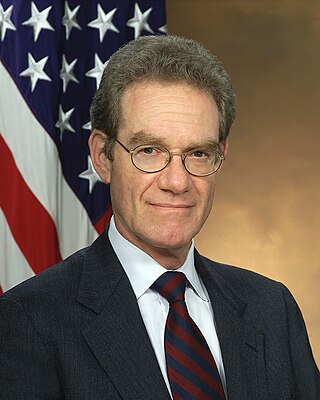
Peter Warren Rodman was an American attorney, government official, author, and national security adviser.

Linkage was a foreign policy that was pursued by the United States and championed by Richard Nixon and Henry Kissinger in the 1970s détente, during the Cold War. The policy aimed to persuade the Soviet Union to co-operate in restraining revolutions in the Third World in return for concessions in nuclear and economic fields. Soviet interventions occurred in various conflicts such as the Angolan Civil War, the Mozambican Civil War, and the Ogaden War, while many revolutions still occurred in Third World countries, undermining the policy.

From February 21 to 28, 1972, United States President Richard Nixon visited the People's Republic of China (PRC) in the culmination of his administration's efforts to establish relations with the PRC after years of U.S. diplomatic policy that favored the Republic of China in Taiwan. His visit was the first time a U.S. president had visited the PRC, and his arrival in Beijing ended 25 years of no communication or diplomatic ties between the two countries. Nixon visited the PRC to gain more leverage over relations with the Soviet Union, following the Sino-Soviet split. The normalization of ties culminated in 1979, when the U.S. transferred diplomatic recognition from Taipei to Beijing and established full relations with the PRC.

Martin Sean Indyk was an Australian-American diplomat and foreign relations analyst with expertise in the Middle East.
This bibliography of Richard Nixon includes publications by Richard Nixon, the 37th president of the United States, and books and scholarly articles about him and his policies.
The Leo Baeck Medal has been awarded since 1978 by the Leo Baeck Institute of New York City, an international research institute devoted to the study of the history and culture of German-speaking Jewry. It is the highest recognition the Institute bestows upon those who have helped preserve the spirit of German-speaking Jewry in culture, academia, politics, and philanthropy.
Operation Giant Lance was a secret U.S. nuclear alert operation by the United States that the Strategic Air Command carried out in late October 1969. Giant Lance was one component of a multi-pronged military exercise, the Joint Chiefs of Staff Readiness Test that the Joint Chiefs developed and carried out during October 1969 in response to White House orders. On 10 October 1969, on the advice of National Security Advisor Henry Kissinger, U.S. President Richard Nixon issued the order for the readiness test that led to Giant Lance.

George Pratt Shultz was an American economist, businessman, diplomat and statesman. He served in various positions under two different Republican presidents and is one of the only two persons to have held four different Cabinet-level posts, the other being Elliot Richardson. Shultz played a major role in shaping the foreign policy of the Ronald Reagan administration, and conservative foreign policy thought thereafter.
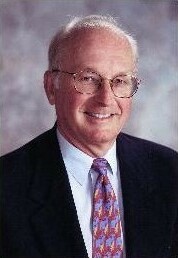
William B. Quandt is an American scholar, author, and professor emeritus in the Department of Politics at the University of Virginia. He previously served as senior fellow in the Foreign Policy Studies Program at the Brookings Institution and as a member on the National Security Council in the Richard Nixon and Jimmy Carter administrations. He was actively involved in the negotiations that led to the Camp David Accords and the Egypt–Israel peace treaty. His areas of expertise include Algeria, Egypt, Israel, Palestine, the Israeli–Palestinian peace process, and U.S. foreign policy.
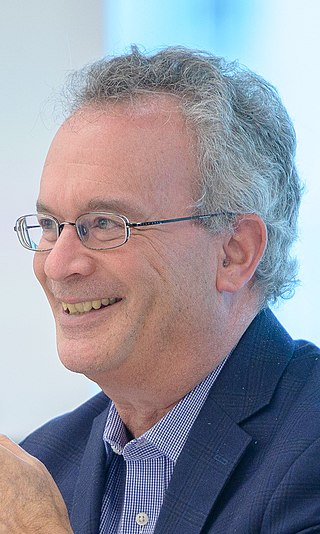
James M. Goldgeier is a professor of international relations at the School of International Service at American University in Washington, D.C., where he served as dean from 2011 to 2017.
In political science, triangular diplomacy is a foreign policy of the United States, developed during the Vietnam War (1955–1975) by Henry Kissinger, as a means to manage relations between the contesting communist powers, the Soviet Union and China. Connecting heavily with the correlating policy of linkage, the policy was intended to exploit the ongoing rivalry between the two Communist powers, as a means to strengthen American hegemony and diplomatic interest.

The United States foreign policy during the 1974–1977 presidency of Gerald Ford was marked by efforts to de-escalate the Cold War. Ford focused on maintaining stability and promoting détente with the Soviet Union. One of Ford's key foreign policy achievements was the signing of the Helsinki Accords in 1975. The accords were a series of agreements between the US, Soviet Union, and other European countries that aimed to promote human rights, economic cooperation, and peaceful relations between East and West. Ford met with Soviet leader Leonid Brezhnev several times, and the two countries signed the Strategic Arms Limitation Talks in 1979, which aimed to limit the number of nuclear weapons held by the two superpowers.
Janne E. Nolan was an American academic, foreign policy advisor, and expert on nuclear arms control and nonproliferation. She held senior positions in the Department of State, as a staffer for the Senate, and served on multiple blue ribbon commissions. She was well known for supporting generations of women in the traditionally male dominated field of nuclear security.
References
- ↑ "Helmut Sonnenfeldt, top adviser to Kissinger, dies at 86". stljewishlight.com. 2012-11-21. Archived from the original on 2013-06-16. Retrieved 2012-11-21.
- 1 2 3 4 5 6 Martin, Douglas (21 November 2012). "Helmut Sonnenfeldt, Expert on Soviet and European Affairs, Is Dead at 86". The New York Times. Retrieved 22 November 2012.
- 1 2 Langer, Emily (21 November 2012). "Helmut Sonnenfeldt, aide to Henry Kissinger, dies at 86". The Washington Post. Retrieved 22 November 2012.
- ↑ Polner, Murray (1982). American Jewish biographies. Facts on File, inc. ISBN 9780871964625.
- ↑ Anthea Gerrie, "Revealed: the wartime school that saved lives" The Jewish Chronicle (August 11, 2011). Retrieved September 29, 2011
- ↑ Daniel Möckli, European Foreign Policy during the Cold War. Heath, Brandt, Pompidou and the Dream of Political Unity, London 2009, p. 179.
- ↑ "Foreign Relations of the United States, 1969–1976, Volume XIII, Soviet Union, October 1970–October 1971 - Office of the Historian".
- ↑ Kalb, Marvin (30 November 2001). "The Ever-Expanding Definition of an "American": A Tribute to Helmut Sonnenfeldt". Brookings Institution. Retrieved 22 November 2012.
- ↑ Legacy.com
- ↑ LBI News. Leo Baeck Institute. 2004.
Further reading
- Hunter, Edward. "Why He Was Planted in Treasury: Sonnenfeldt Case Explained." Tactics, vol. 10, no. 11 (November 20, 1973): 8-9. JSTOR community.28147164.
- "Remembering Helmut Sonnenfeldt: A Major Figure in U.S. Foreign Policy" (proceedings). Washington: Brookings Institution (November 18, 2019).
External links
- Biography at History Commons.org site Archived 2011-05-01 at the Wayback Machine
- Appearances on C-SPAN
Helmut Sonnenfeldt | |
|---|---|
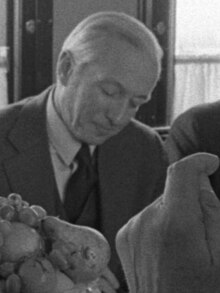 Sonnenfeldt in 1974, accompanying President Ford to the Vladivostok Summit Meeting on Arms Control | |
| 17th Counselor of the United States Department of State | |
| In office January 7, 1974 –February 21, 1977 |
| International | |
|---|---|
| National | |
| People | |
| Other | |